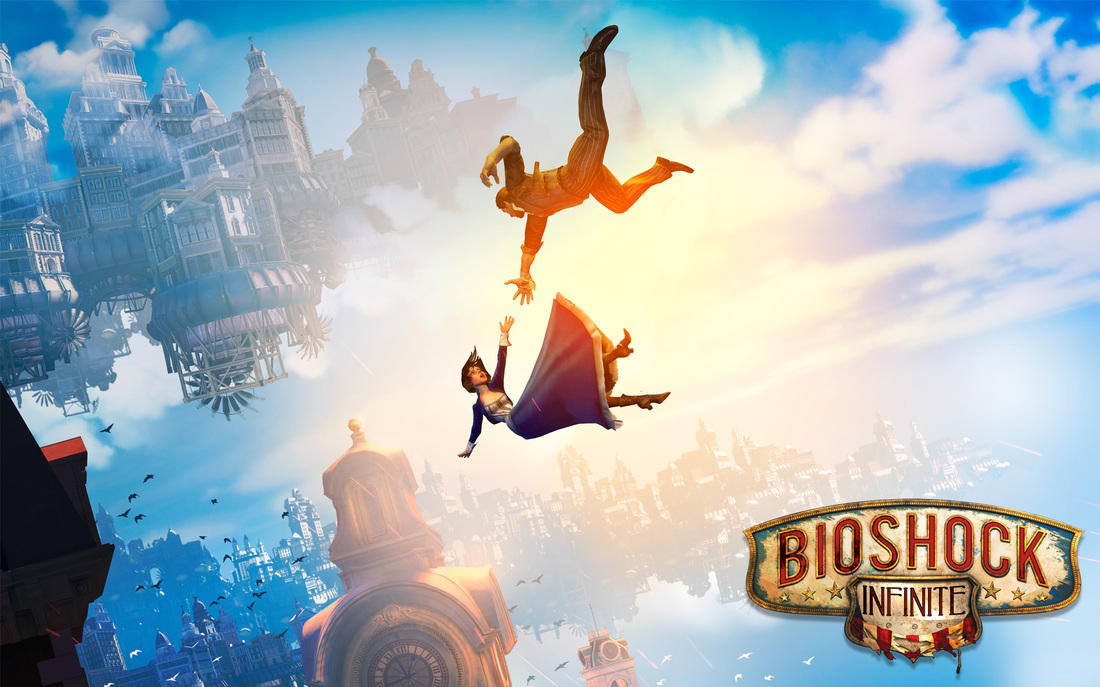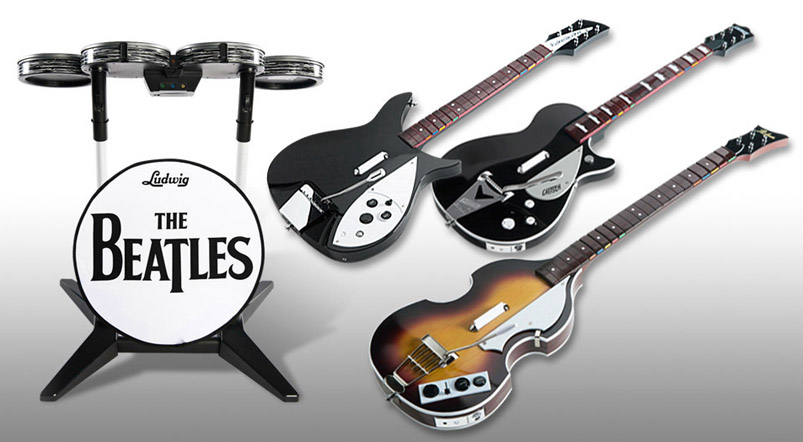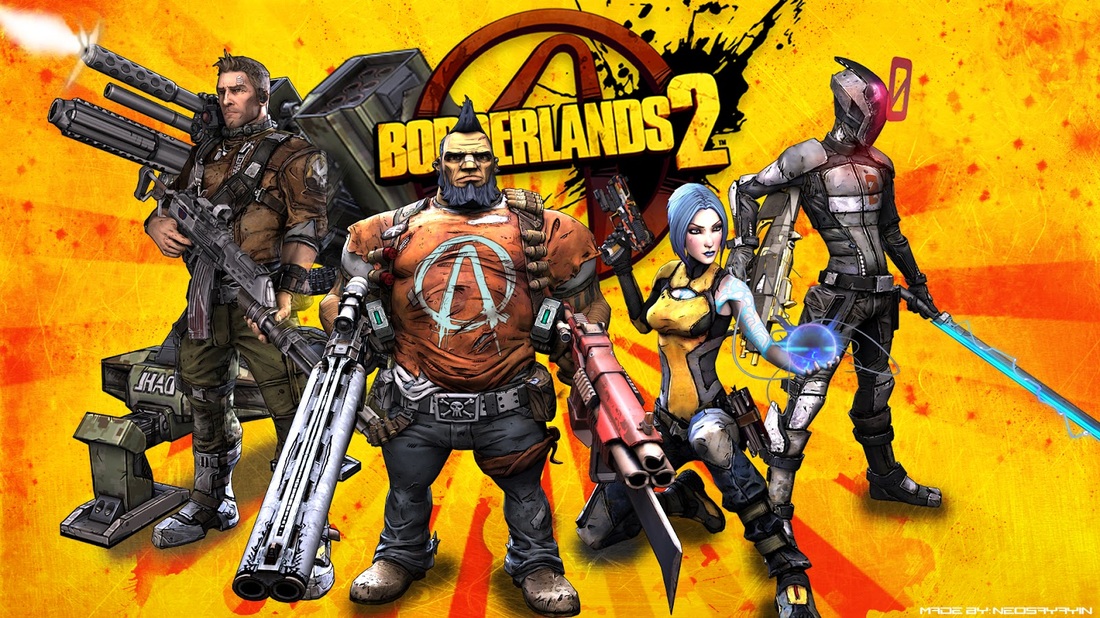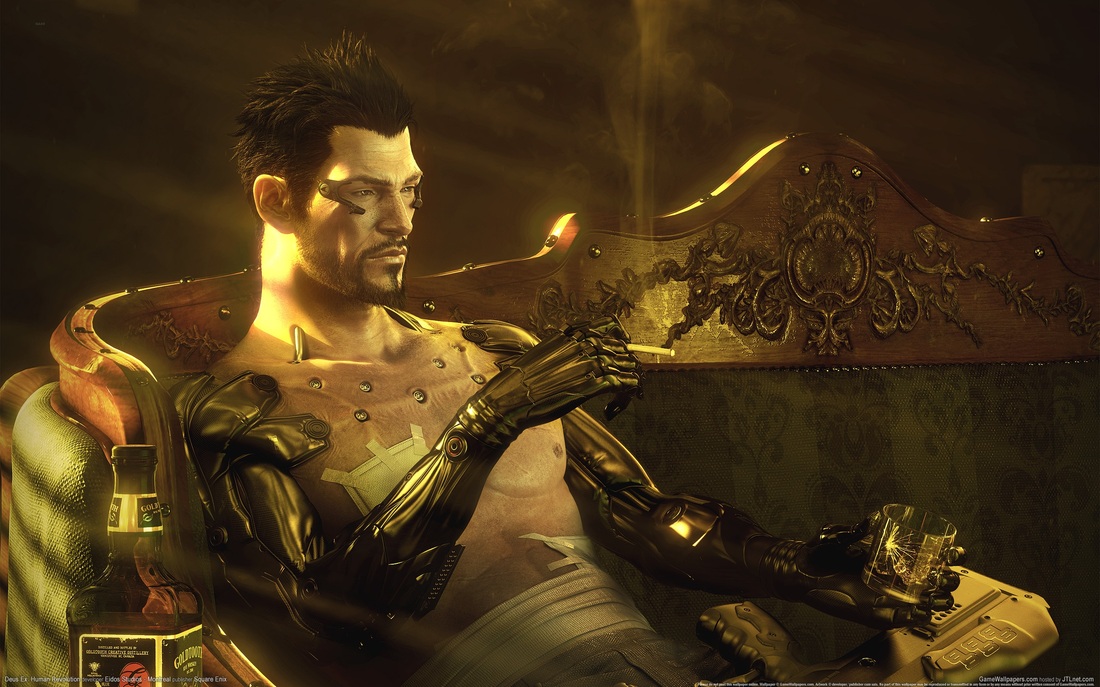This week’s ‘Meet the Author’ series marches on with a topic that I think many people will find familiar, some people discover, and some will want to write off. The focus is on videogames, but I’m going to be looking more specifically at gaming as a creative medium and how that ties into writing. I won’t be doing a top five list (as even defining what constitutes a videogame is nearly impossible), but I will be pointing to some specific examples of games that illustrate certain points, such as how modern games take to task the social issues that Hollywood used to address, but now shies away from.
As a child of the ‘80s, videogames have always been a part of my life. I was born into the first home console boom, the era of the NES, Super Mario Bros., Duck Hunt, and a light gun. Soon thereafter followed the SNES, Genesis, PlayStation, Xbox, et al. Before I even sampled console gaming, however, I played early games on 5.5” floppy disks loaded into an AT&T personal home computer. I couldn’t even tell you the titles of those old games, but they laid the foundation for my zeal for videogames and what they represented: self-directed entertainment, creativity, and art.
As the years passed, I transitioned from PC gaming, to console, to a hybrid of the two, and then back to PCs. What drew me back into the PC gaming market was both the desire to build my own rig to game on, and the quality in content and capacity that was becoming the norm for the PC game market. While the console game industry did have some glimmering moments of genius, such as with the Rock Band series, the majority of the games coming out seemed more and more to be simply exercises in graphical prowess with watered down gameplay and repetitive characters and stories. Though the gap is closing now, even the most powerful console still cannot stand up to the juggernaut that is a well-built gaming PC.
As a child of the ‘80s, videogames have always been a part of my life. I was born into the first home console boom, the era of the NES, Super Mario Bros., Duck Hunt, and a light gun. Soon thereafter followed the SNES, Genesis, PlayStation, Xbox, et al. Before I even sampled console gaming, however, I played early games on 5.5” floppy disks loaded into an AT&T personal home computer. I couldn’t even tell you the titles of those old games, but they laid the foundation for my zeal for videogames and what they represented: self-directed entertainment, creativity, and art.
As the years passed, I transitioned from PC gaming, to console, to a hybrid of the two, and then back to PCs. What drew me back into the PC gaming market was both the desire to build my own rig to game on, and the quality in content and capacity that was becoming the norm for the PC game market. While the console game industry did have some glimmering moments of genius, such as with the Rock Band series, the majority of the games coming out seemed more and more to be simply exercises in graphical prowess with watered down gameplay and repetitive characters and stories. Though the gap is closing now, even the most powerful console still cannot stand up to the juggernaut that is a well-built gaming PC.
While the console market became saturated with repetitive sequels and drab titles, I rediscovered several PC titles that were fresh, original, and challenging. Many of these titles were either simultaneously available on console or else later ported, but always with compromises to graphics, controls, or other factors. The added benefit to rejoining the PC fold was that aside from one or two “need to own” titles, the games I wanted to play were slightly older, and thus could be had for a bargain. The result is that I am even now slogging through a backlog of titles and having tremendous fun finding my own path through the gaming industry without the pressures that come with trying to keep up with the latest and greatest. An added benefit is that I have been more willing to explore niche titles and stray from my traditional gameplay preferences, resulting in some very rewarding experiences.
Viewing video games through the lens of an author allows me to both appreciate the game as a form of entertainment, as well as to look behind the curtain at the mechanics, design, art, and writing, building on the aforementioned rewarding experiences. There are several questions that come up often and that I like to examine in regards to digital entertainment. Are videogames art? Is playing a videogame a waste of time, or is it a hobby, a skill, to be worked at and perfected like any other? Should writers in the videogame industry be given as much merit and popular acclaim as someone such as J. K. Rowling? In many respects, the industry is so new and evolving so rapidly that we haven’t even had time to fully consider these questions. Even now we’re just beginning to scratch the surface as to what makes a “good” game, often using movies as a benchmark, as it’s the nearest known equivalent against which we can measure.
In this there is some truth. Movies can be considered well made on many different fronts, whether it’s the acting, the editing, the visual effects, or even the musical score. Where video games move beyond movies, however, is through the increase in the amount of freedom and resultant consequence that has become a staple in many of the greatest videogame titles. From a writer’s perspective, this aspect is particularly exciting. When writing a novel, there is a set path that an author must ultimately take, forgoing many “what if” scenarios and committing to only one outcome (unless you’re writing those old “Choose Your Own Adventure” books). In video games, the “what if” is a driving force, and let’s both the writer and the player experience multiple scenarios, exploring alternate decisions, motives, and character developments.
It is for this reason that I have come to greatly enjoy the more cerebral videogames, as well as those rooted deeply in strategy and tactics. These are the games that I feel are hall of fame members that showcase how videogames have transformed into a multifaceted art form, pulling together disparate elements to craft an experience that is engrossing and unique. It’s comforting to know that even though ten similar, dull games might come out, the eleventh will be something special and unique. This even applies to the genre most often derided as formulaic: the first person shooter.
One of my favorite examples is the Borderlands series, a franchise which is goes beyond the FPS genre by being artistically unique, well written, full of excellent voice talent, and completely over the top. Not only is it over the top, but it knows it and play to it, making it a great strength. I can’t tell you how much I laughed when I found a pony made out of diamond named ‘Butt Stallion’, which was shortly after I picked up a rifle that fired swords that exploded like grenades. Read that sentence again, it’s all true. On the more serious side, games such as those in the Bioshock series are marvels of artistic beauty and gripping storytelling, with twists and betrayals that will keep you on the edge of your seat as you wonder what impossible situation you may be shoved into next.
On a parting note, I’ll say that cyberpunk writers are also well covered in video games, with several titles capturing the anxiety and paranoia of the dark future. Games such as the original Deus Ex and its later reiteration, Deus Ex: Human Revolution, mix elements of RPG gameplay with stealthy tactics to lead players down a dark and twisted path where nothing is certain except for the need to watch your back and keep your cool.
I think it’s safe to say that videogames have impacted me as a writer, and there’s no reason they can’t do the same for other aspiring authors. We all have to draw from somewhere, and I appreciate the diversity I get from movies, books, and videogames, all of which help to fuel my imagination and inspire me to push my writing ability in the hopes of crafting that one moment that so completely grips the reader, they feel like they’re actually there in the pages of my novel.
Next week my ‘Meet the Author’ series moves into outside hobbies. See if you can’t find some ideas for new challenges you’d like to tackle in life. I’ll also be updating my blog on a more regular basis, so look for entries on both Mondays and Wednesdays. This is a preliminary schedule as I try to create more valuable content for my readers. Things may shift around as I get into the new rhythm.
A.C. Harrison
Like what you see here? Spread the word and support indie authors! Follow me on Facebook or Twitter. Find me on Smashwords and Kindlemojo.
Next week my ‘Meet the Author’ series moves into outside hobbies. See if you can’t find some ideas for new challenges you’d like to tackle in life. I’ll also be updating my blog on a more regular basis, so look for entries on both Mondays and Wednesdays. This is a preliminary schedule as I try to create more valuable content for my readers. Things may shift around as I get into the new rhythm.
A.C. Harrison
Like what you see here? Spread the word and support indie authors! Follow me on Facebook or Twitter. Find me on Smashwords and Kindlemojo.










 RSS Feed
RSS Feed